As I was born and raised on Cortes Island, I am familiar with the now-blue building on the way to the Whaletown public docks. When I was little, I would pass the Louisa Tooker Library when I went with my mother to get the mail. It never seemed to be open (you can currently visit by contacting Bernice McGowan at bh.mcroman@gmail.com or 250-935-6405 to request the code for the door) and to this day I have yet to pay it a visit. But somehow, I have always felt a connection to the little building. Since beginning work at the Cortes Museum and spending time in the archives, I have become aware of how important a role Mrs. Tooker played in her community. With this knowledge, I thought it important to remind people of the woman who left a legacy impactful enough that it remains standing to this day.
Throughout this article, I will be referring to Louisa Tooker as Mrs. Tooker whenever possible because according to notes by Doris Henderson, “in those days [late 1920s] even adults didn’t call each other by their first names. I never thought of them as having first names, as I never heard them.”
I would like to give a special thanks to Tari (Tooker) Chiasson, Louisa’s granddaughter and daughter of Edward Tooker. I had the privilege to connect with her over memories of her grandmother and family. She has been an invaluable resource and help in the creation of this article and I am very appreciative to her for the vulnerability and generosity with which she shared her memories. – Natalia Nybida
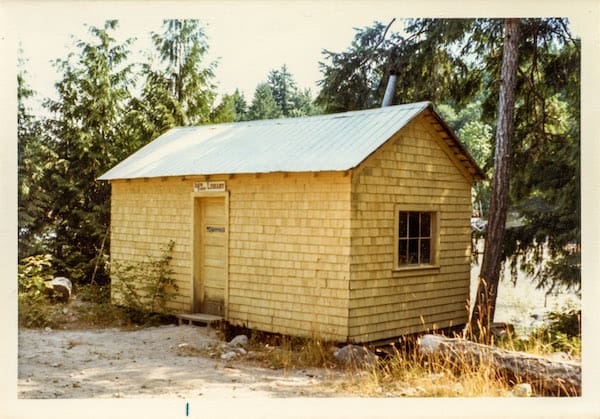
Mrs. Tooker’s Legacy
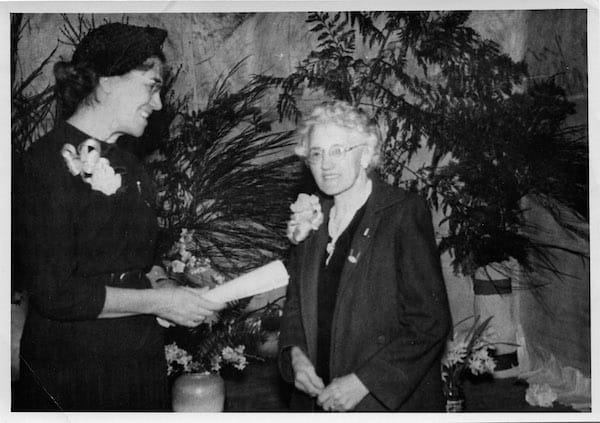
In her handwritten notes, Bertha (Tooker) Reedel says, [Mrs. Tooker] “was one of the original members of the Family Circle Club, followed by the Whaletown Women’s Institute (WWI) and was a very active member of both. She received a life membership scroll and pin to the WWI of which she held the position of President for twelve years.”
The WWI became a branch of the Women’s Institute (WI) in 1923, “a community service organization for women with the goals of fostering the skills of rural women, improving their lives and works, and celebrating their achievements. During its years of activity, the WWI was very active in working for local improvement” – https://collections.cortesmuseum.com/en/permalink/descriptions13022
The Louisa Tooker library was originally owned by the Farmer’s Institute in Whaletown. It was built in 1926 as a response to people living in the Gorge needing somewhere to wait for the steamship during the rains and the cold and the dark. “Later it was handed over to the WI who met there and held many bake sales there. At a Whaletown Community Club (WCC) meeting Feb. 21st, 1958, the WCC agreed to take over the library from the WWI. ” – April 1981, On Our Astonishing Little Corner of the World.
“The WWI held open house … Sunday, February 23, to dedicate the library to the memory of Mrs. L. K. Tooker. Mrs. P. Douglas, as president of the WWI, spoke feelingly of the high regard in which Mrs. Tooker was held, not only by the WWI, which she helped found over 30 years ago, but by the entire community.” – “Whaletown Round-up” by M. M. McMillan.
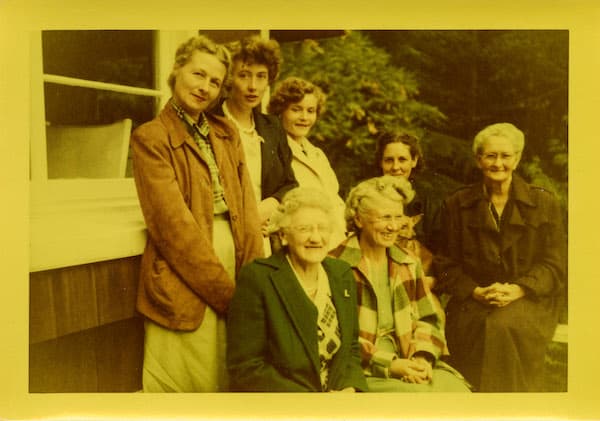
Mrs. Tooker Family and Home
Tari (Tooker) Chiasson says, “Louisa was a tiny woman, barely five feet tall and arrived in Canada from England on the Empress of Ireland from Liverpool to Quebec on Oct. 25, 1907, at the age of 25. She married Frank Tooker on Sept. 14, 1909, in Christ Church Cathedral in Vancouver.”
In her handwritten notes, Bertha (Tooker) Reedel says, “My parents, Frank and Louisa Tooker, and three-year-old brother Frank Jr. came to Coulter Bay in 1914 and pre-empted 124 acres of land beside a creek. I was born a year later and brother Edward three years later. Mother was in Vancouver for these events!”
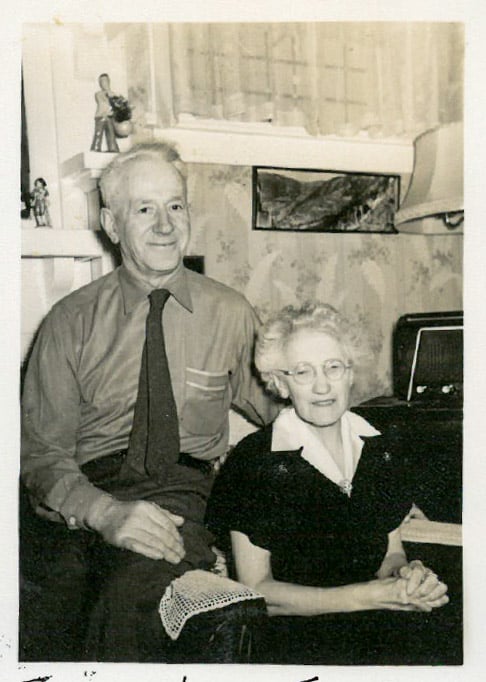
Tari (Tooker) Chiasson says, “Frank Tooker Sr. was born on September 06, 1884, in Brockville, On, and left home as a teenager eventually making his way to the BC coast. His main occupation was as a commercial house painter at various locations in Vancouver and Powell River between 1927 and 1929, and in Campbell River at Painter’s lodge. The family was together for those years renting a house in Powell River and the children attended school there. Because of the lack of work for him on Cortes Island, he spent long periods of time working in Vancouver with large gaps between there and visits home. Grandpa Frank passed away in February of 1954 in Campbell River Hospital.”
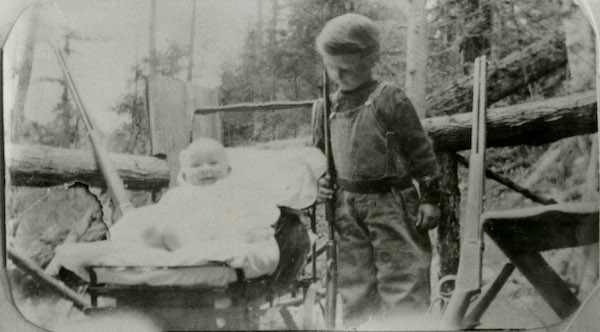
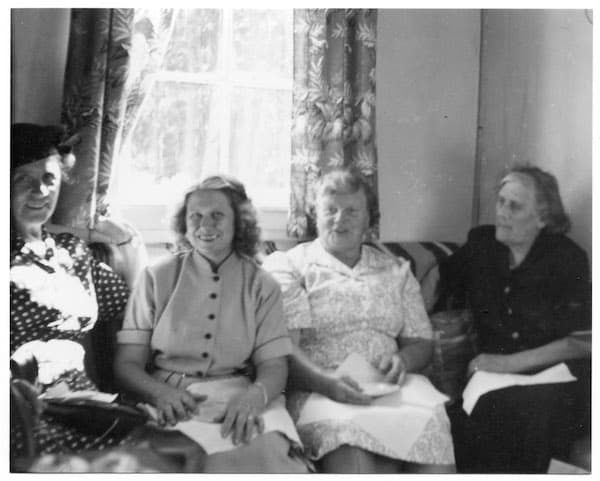
A write-up about Cortes Island in the late 1920s by Doris Henderson says, “If you knew Frank, her [Louisa’s] son, you wouldn’t forget him – the party didn’t start until he arrived. He tried to court every girl who lived on or visited the island. I remember telling my mom that Frank was coming to take me for a boat ride – she met him on the beach and said No – I was 13.”
Tari (Tooker) Chiasson says, “Dad [Ed Tooker], born on May 1, 1918, was a quiet-spoken man, a kind, caring and gentle father of two, grandfather of four and great grandfather of seven, with a good sense of humour and willing to help family in any way … (Edward had a) quirky sense of humor and love of funny limericks remembered from years back which he liberally sprinkled throughout my autograph book a few years before he passed away. We couldn’t have asked or hoped for a better father. He enjoyed socializing with family and old friends but also had quiet time at home with tv and local interest books or puttering in the yard. He was great at keeping in touch by phoning family every day especially checking on anyone who was ill. He sent cards to all his immediate family for every occasion and often dropped off treats to his great-grandchildren.”
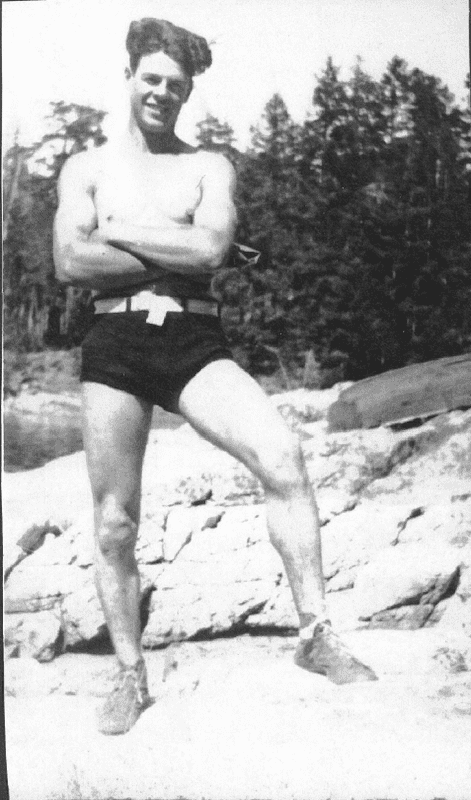
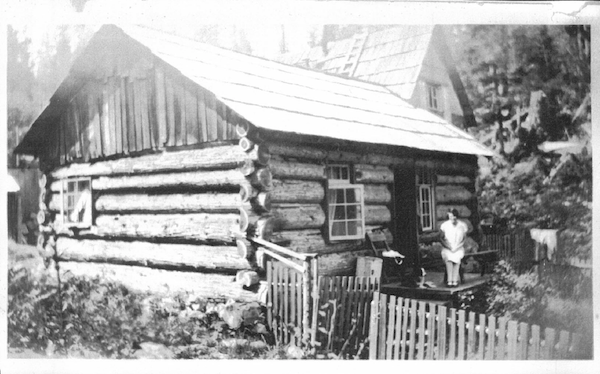
Memories of Mrs. Tooker
Mrs. Tooker had an active social life. Doris Henderson says in a write-up about Cortes Island in the late 1920s, “Mrs. Tooker, always with a friendly smile – walking from Coulter Bay with a cake or chicken for some gathering …”
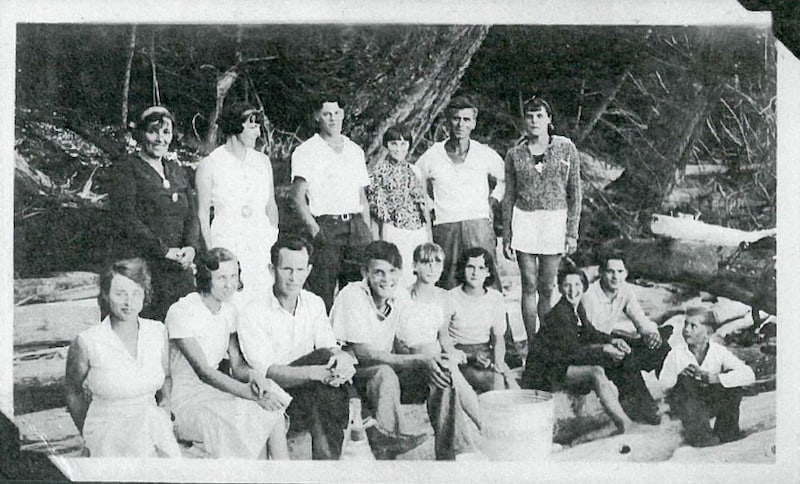
Doreen Thompson says, “how well I remember Mrs. Tooker out at Coulter Bay – even a child didn’t mind the long walk out there to spend a day or an afternoon visiting at her home … It was there that we children (there were usually several of us, days at Mrs. Tooker’s being more than a one-family affair) got to crank the old wringer that was mounted on a washtub stand outside the back door; it was there that blackberries grew rampant on the out-house trail. It was also there, inside the house itself, that we got to sit in the only chair that we knew of that made into a bed … And I’ll never forget that Mrs. Tooker always remembered that I hated mashed potatoes and always served mine plain. That was real love…and she showed that love to everyone, child or adult.”
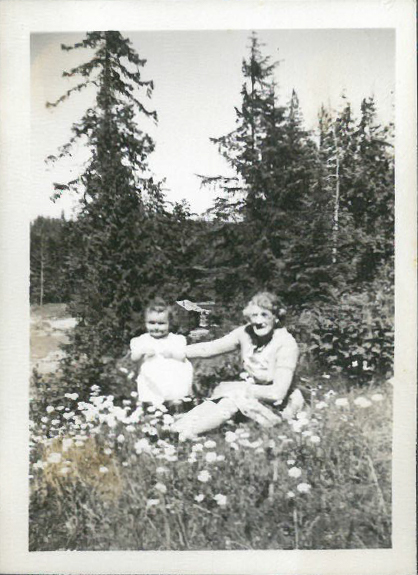
Karen Mann Lee says, “I remember visiting Mrs. Tooker – our mother always dressed us up – a day at Mrs. Tooker’s was an event.”
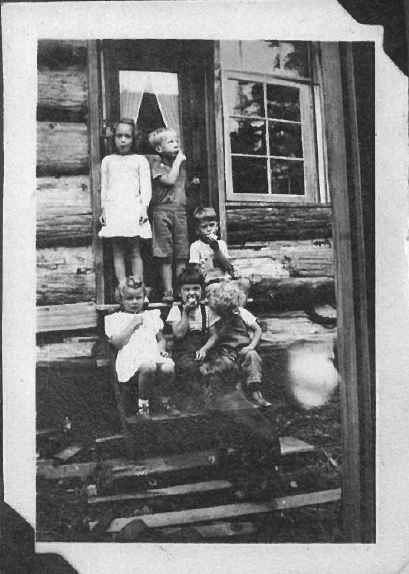
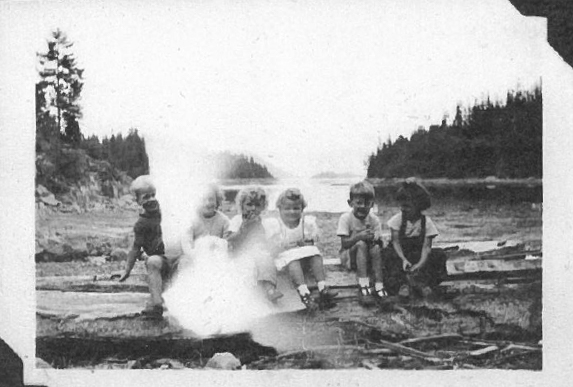
“Mrs. Tooker lived at Coulter Bay. Most Friday nights some of the local young people walked the trail to her home. Sometimes we danced to records played on a crank-style gramophone, we sang and we played card games or board games … and we talked.” – Ramona Finnie Vanstone
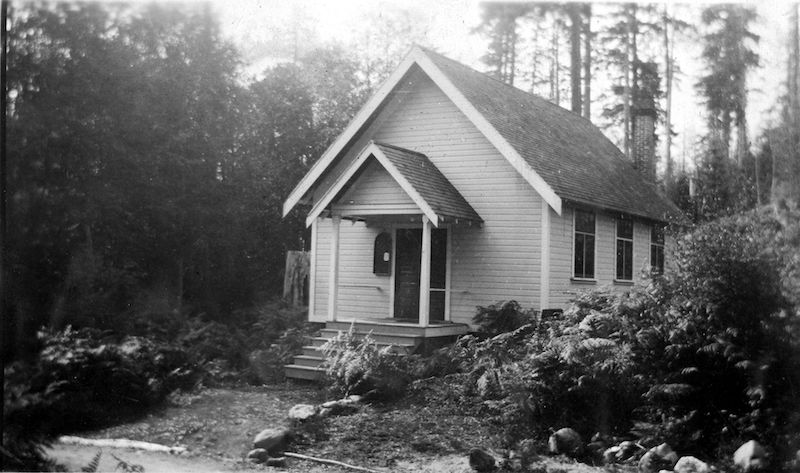
Tari (Tooker) Chiasson says, “when I was still quite young, 9 or 10 maybe, I was allowed to attend the Gorge Community dances held at the Hall bordering our property but only because I went with Nanny. Once again, she would walk from Coulter Bay to our house on dance night carrying her bag with house slippers and good shoes while walking in gum boots. She had supper with us (before walking) the short distance to the Hall. It was her job to start the fire in the large kitchen woodstove then to make coffee for the crowd. Once the orchestra got tuned up and the dancing started, I felt quite grown up sitting beside her on the benches along the walls listening to that wonderful music and watching the dancers. I was too young to join in, but she did!”
An undated, handwritten letter by Mary McMillan shares a humorous memory of Mrs. Tooker:
“Mrs. Tooker did not have much love for boating. In fact, she only felt safe (when) either her son Frank or her neighbour Horace Hack was skipper. Unfortunately, I had a small boat called the Spit Fire and fished it commercially.
I got near Refuge Cove one day and dropped (in) at Bertha’s. Her mother (Louisa Tooker) had been visiting but wanted to go home. So, I volunteered my services, surprising all hands, she said she’d come with me.
So, we arrived at Coulter Bay. There was a float to tie to across from Mrs. Tooker’s. So, I putted in and tied up. She decided to (climb in) the skiff (to) get home. She put one foot on the (gunwale) and pushed. Down she went. I was terrified. But she bobbed (up) and I grabbed her (and) managed to get her back on the Spit Fire. She had worn her gum boots and heavy winter coat. Ugh!”
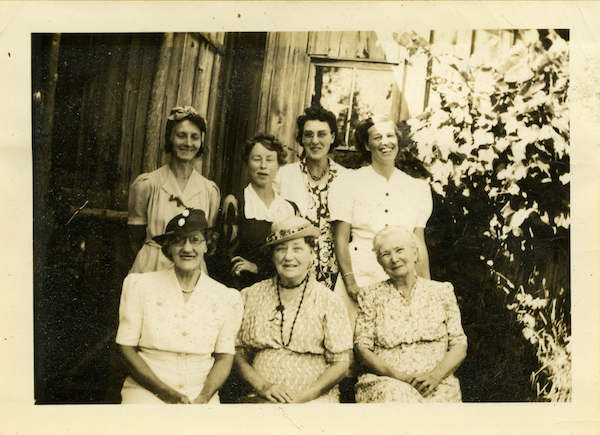
In a letter Gilean (Jill) Douglas writes to Bertha Reedel dated Sept. 14, 1963, we learn more about what Mrs. Tooker meant to those who knew her. She says, “I was privileged to have many long talks with your mother [Louisa] about the old days. I loved her very much and I shall never cease being grateful for knowing her, even for such a short time. It has been for her sake that I have kept the WWI going.”
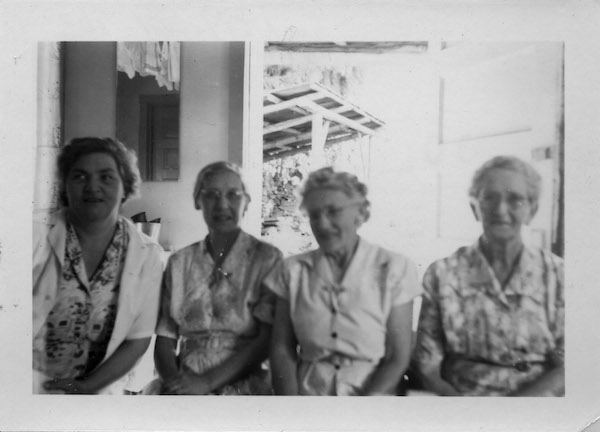
Diane Hansen shares memories of her grandmother for Reel Youth’s 2020 Celebrating Senior’s Film Program. She says, when Mrs. Tooker “was seventy-five years old, she lived out at Coulter Bay. No one else lived there, there was no power, there was no phone, and she had no car or anything. So, she would walk into Whaletown once a week through the logging road and the trail and then onto the main road. And she would visit friends, get the mail, get some groceries, then she’d stay and have dinner with one of her friends and play cards till probably midnight or longer. Then she’d walk home all by herself on that lonely long road … and for a light she had what they used to call a bug light. It was an old jam can with a candle in it and a wire handle. So, she was quite a lady. And I think she was 4’11 or something, she was quite short. And also, people said she never said anything bad about anyone; and if they’re having tea and talking about some local scoundrel she would say, “oh but I think he was good to his mother.” That’s what her attitude was; so, she always found the good in everybody.”
Tari (Tooker) Chiasson says, “One thing Dad [Edward Tooker] mentioned was that he had never once seen his mom [Mrs. Tooker] lie down to relax or read during the day. Never idle. I think it would be safe to say she wasn’t known for having downtime, always doing something. One thing she did was write letters to family and I have a postcard she sent to her half-sister in Vancouver. Being instrumental in bringing a library to Whaletown and with her keen interest and dedication in working long hours there weekly I can only assume she appreciated books. I remember hearing that she was a bit of a ‘night owl’ and that in summer she would go for a swim in the bay in the cool of evening after dark. I suspect she used these late hours for her correspondence too over a cup of tea … or two. Louisa helped out with all her grandchildren when needed. Our Nanny Louisa [as she was known to my sister Jacquelyn and me as well as to Bertha’s six children], typically English, she was a cat lover and as well as her pure black mother cat ‘Miranda’ there were always a few spare cats around.
“My last memory of Nanny was at the end of summer 1956 when she wanted to come with our family to the PNE in Vancouver staying in our usual hotel, the Alcazar, together. Mom noticed that Nanny didn’t look very well one morning and suggested she stay in the room and rest, but she said, ‘No, I want to be with the girls so she didn’t miss one outing of that trip. We lost her early in Nov of that year in Powell River Hospital and I’ve always been thankful for that time together by her great effort.”
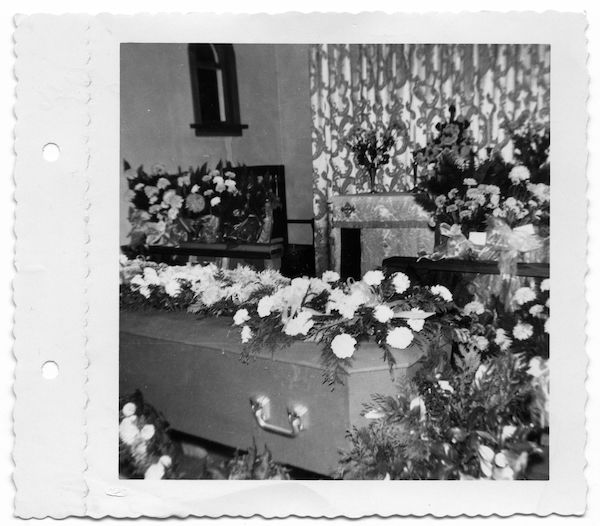
“Last Rites Held for Louisa Tooker” by Gilean Douglas says, “In September our beloved Mrs. Louisa Tooker went away for holiday. Today she came home – for the last time. It was a chilly rainy day; the sort of day that never stopped Mrs. Tooker from walking miles from her home at Coulter Bay to go to church or to a ‘do’ [afternoon tea] or to cheer the sick and sorrowful.
“Nor did it stop those who crowded into the little Church of St. John Baptist to say goodbye to her. Most of them had known her for many years, and to know her was to love her. She was a charter member of our institute, formed 34 years ago, and one of the first members of both the WCC and the Women’s Auxiliary [of the Anglican Church].
“She is as much a part of this place as the trees and soil and rock. She was like good soil herself, where only good things can grow, for she neither thought nor spoke evil of anything or anyone. When people were very foolish, she said ‘we must help them by being kind to them.’ She helped everyone, she was always kind. This wasn’t a weakness; it was strength. When there was a principle to be stated or a wrong to be righted, Mrs. Tooker spoke her mind firmly and clearly. Her mind was full of charity and understanding and such pure unselfishness that it seemed to burn like a white light inside of her.
“So, she came home. But not to the little house at Coulter Bay which gave her such a feeling of warmth and security and pride and which she kept so spotless and so full of friendliness. Not to the cemetery either, where her tiny, frail body lies and where she used to work so hard to keep the weeds from the graves and the headstones free of moss. Not to any one of these places, but to all of them…To every home and hall and heart of Whaletown. She will never go away from us again.”
————————————-
– Most photographs come from the Cortes Island Museum Archives.
– Some photographs and quotations come from Photographs and Stories Carrington Bay and Coulter Bay, one of the history albums available at the Museum or online on the History Albums page.
– Some quotations and information come from the Museum’s Information Files containing clippings or photocopied newspaper and magazine articles, correspondence (including printed email correspondence) and other non-archival material, with content listing available in our Online Archives.

